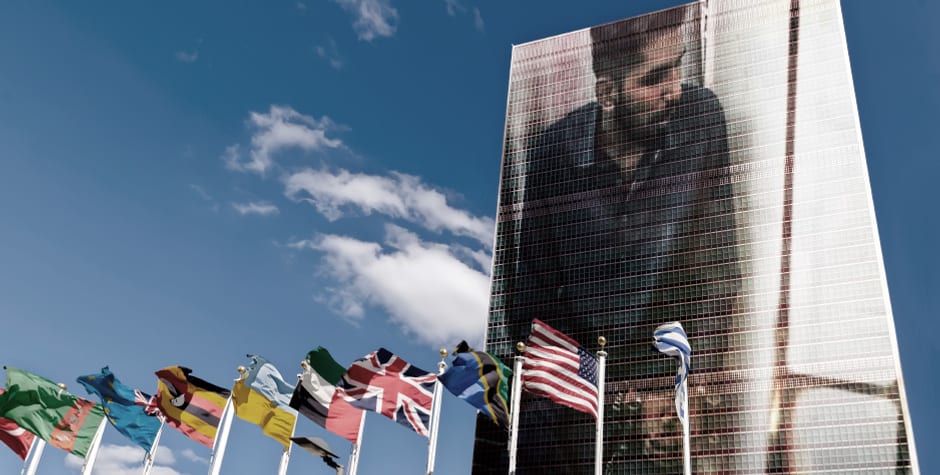Breaking: UN Working Group Issues Decision Calling on Pakistan To “Immediately and Unconditionally Release” Shahzad Masih, the Christian on Death Row for Blasphemy
We have been fighting for years for Shahzad Masih, a Christian who was only 16 years old when he was arrested and falsely charged under Pakistan’s blasphemy laws.
As we have reported before, Shahzad was arrested in 2017 for simply saying to a Muslim co-worker that his father’s Muslim friend named Ali reacts negatively whenever he hears the name Muhammad. Even though Shahzad’s comment did not constitute an offense and the investigating officer found no “blasphemy” in Shahzad’s speech, the prosecution brought charges and the court tried him as an adult. Further, during the trial, all the prosecution witnesses testified that Shahzad merely indicated what his father’s friend said—which clearly shows Shahzad did not blaspheme. Yet, the trial court sentenced him to death.
After his conviction and death sentence by a trial court in November 2022, we filed an official complaint with the United Nations Working Group on Arbitrary Detention (WGAD), a complaint mechanism within the United Nations that deals with issues of arbitrary detention, communicates with the government at issue, and makes legal determinations whether the detention is arbitrary.
The complaint detailed every single violation of Shahzad’s fundamental rights. We highlighted that Shahzad was tried as an adult even though the law required that he be tried as a juvenile. We also detailed violations of his rights under the International Covenant on Civil and Political Rights (ICCPR) to which Pakistan is a party, as well as the Universal Declaration of Human Rights (UDHR).
The U.N. WGAD just publicly issued its decision holding that Shahzad’s rights were violated. The WGAD found, among other things, that Shahzad did nothing more than exercise his freedom of expression, yet he was interrogated without a lawyer present, was tried as an adult, and did not receive a fair hearing by an independent and impartial tribunal.
The opinion further stated:
The Working Group is struck by the numerous procedural irregularities that have permeated Mr. Masih’s case: the lack of a legal basis for his arrest, as it was not he who had made any alleged blasphemous statement; the denial of his right to be tried as a juvenile, in violation of domestic law; the insistence on pursuing his case, even though the police investigation had not yielded such a recommendation; and the apparent intimidation of the judiciary by a Muslim religious organization. . . .
In the light of the foregoing, the Working Group renders the following opinion:
The deprivation of liberty of Shahzad Masih, being in contravention of articles 2, 3, 7, 8, 9, 10 and 19 of the Universal Declaration of Human Rights and articles 2, 9, 14, 19 and 26 of the International Covenant on Civil and Political Rights, is arbitrary and falls within categories I, II, III and V.
The U.N. WGAD called on the Pakistani government, among other things, “to take the steps necessary to remedy the situation of Mr. Masih without delay and bring it into conformity with the relevant international norms” and “release Mr. Masih immediately and accord him an enforceable right to compensation and other reparations.”
The U.N. WGAD went so far as to rule that “no trial should have been held.” The opinion also keyed into the fact that at trial “the judges were intimidated by the members of the Muslim organization, who have regularly attended the hearings. Furthermore, the leader of that organization reportedly wrote, in a statement published on a social media platform, that members of his organization would kill Mr. Masih themselves if the judge did not convict him.”
Finally, the U.N. Working Group noted that portions of Shahzad's, now 2,445 days of imprisonment, have been subjected to “solitary confinement”:
The Working Group is gravely concerned about the health and well-being of Mr. Masih, noting that, since he received the death sentence, his health has reportedly deteriorated further. . . . The Working Group urges the Government to immediately and unconditionally release him and to ensure that he receives the medical attention required.
We will continue fighting to free Shahzad. We demand that Pakistani authorities comply with this opinion and release Shahzad immediately. In the meantime, we are also working with our team on the ground to ensure that the Lahore High Court hears his appeal soon and overturns his conviction.
Please continue to pray as we work with Shahzad, our team, and the authorities to remedy this injustice.
